Life
Spirituality Inc

Is it possible to manage hedge-funds and billion dollar portfolios -- and your soul too?
|
Chandrika Tandon of New York is the founder of Tandon Capital Associates, a consulting firm that advises Fortune 500 companies on streamlining and reengineering their operations.
Mayank Patel of Minneapolis is director of research and development of Cereal Partners Worldwide, a joint venture between General Mills and Nestle, which markets cereals in 130 countries. Ravi Akhoury of New Jersey is chairman and chief executive officer of Mackay Shields, a $40 billion investment management company and vice chairman of New York Life Investment Management. Harish Bharti of Seattle, Wash., is a high-powered lawyer who built his reputation with a class action suit against McDonald’s over beef laced French fries, which resulted in a $12.5 million settlement and an apology. Dr. Dattatreyudu Nori, a cancer specialist who has been adjudged one of the top physicians in the United States by Best Doctors in America, is director of Oncology at three major hospitals in the Columbia Presbyterian medical system in New York.
Five movers and shakers, each of whom have had a major impact on their industries and the world around them – and each says their secret asset is spirituality. They raise an intriguing questions: Can a high net worth individual also have a high net worth self? Is it possible to manage hedge-funds, intricate portfolios, thousands of employees – and your soul too? Although it may sound like an oxymoron, some of them say that spirituality is a vital for success in a materialistic world. “Spirituality keeps me grounded,” says Akhoury. “I don’t think there is a day when I do not meditate.” Spirituality is embedded deep in the Indian psyche and the importance of having an anchor in life can be traced to the Vedas. In the great epic Mahabharata, Arjuna agonized on the battlefield for waging war on his own kin. It was Lord Krishna, his charioteer and guru, who counseled him with the remarkable discourse, which is today known to millions as the Bhagavad Gita. “Perform work in this world, Arjuna, as a man established within himself – without selfish attachments, and alike in success and defeat. For yoga is perfect evenness of mind.”
Throughout Indian history, royal kings and nobles have had personal seers to streer them on the right path, living in the world and yet keeping their equanimity. The modern equivalent are CEOs who keep their cool in a frenetic world of mergers and acquisitions, cut-throat competition and a changing, globalized environment. Tandon, whose company has turned around the fortunes of scores of banks and other institutions across the world, spends her days in the frenetic corporate world torturing over the bottom line and the dollar. She keeps it all in perspective by starting her day with pranayama, the breathing and meditation techniques taught by Sri Sri Ravi Ravi Shankar’s Art of Living. In fact, if she doesn’t begin her day with this regimen, she feels she has forgotten something very important. Ranjan Tandon, her husband, who heads Libra Investors, a major hedge fund, is also a true believer in the value of pranayama and performs it every morning without fail. “He feels it makes him a much better investor, because of the clarity it gives him,” says Tandon. “It’s really about a set of processes which help you. It’s almost as if you blow out the stress. The techniques and processes like meditation, pranayama and yoga are exercises to help the inner polishing.”
She believes, however, that spirituality is not a mantle that one wears or something that can be defined easily: “It is a quest, a difficult process of constantly working on yourself and it is three steps forward, two steps back.” Tandon grew up in the family home in Chennai with her siblings. (Her sister Indra Nooyi is president of PepsiCo and her brother Nandu Narayanan is founder of Trident Investment Management). She grew up influenced by Hindu rituals at home, but also an openness to glean wisdom from all faiths. She even took an elective course in the 10th grade on Catholic scriptures and later attended a Jesuit college. She says, “All around me there was the underlay or foundations of Hinduism, which was very intense, but the structure on top of it was a very secular, open wisdom.”
This willingness to draw from different traditions has given her an indispensable set of tools to guide her: “From my perspective these are a set of ancient techniques that have been handed down to us in an understandable, practical form. Sri Sri Ravi Shankar has done some incredible work in taking the pranayama and meditation techniques and creating almost a standardized approach for us.” Tandon also draws from Buddhist philosophy with its emphasis on compassion, love, kindness and meditation. “I see a big transformation in my whole preparedness for the day. This is not about a spiritual life where you retire to a monastery. I find it’s an extraordinary opportunity to take a few days in a year for one’s self to do an inner polishing in a more intensive way. You go into silence, into deep breathing, into deep meditation. It’s almost as if you’re clearing out the internal debris. “What happens is that when you get this clarity, compassion and sense of well-being, it then opens you up to absorb, to appreciate and that’s a spiritual philosophy that a lot of religions have in common,” she says. “Before I started to do this, it was like being waves on top of an ocean. After you start to do it you just go deep into the ocean – that’s yourself.”
This search for self is something that Ravi Akhoury, who manages the $40 billion Mackay Shields fund, knows about. “It has always been an important part of who I am, but it became more and more important later in my life,” he says. “Frankly I would say that as my workload became more and more stressful, I found this was a haven where I could get a lot of solace from meditation.” It has been part of his daily routine for the past 20 years and he has found that meditation helps him relieve stress, not uncommon in his stressful business. “What happens in these situations is that your mind is always racing, because there’s so much information that is being flung at you from all different sources and you’re supposed to crystallize all this information and make a decision.” he says.
“And your mind is always ticking, always working and it gets tired. And once it gets tired it’s not able to synthesize the information as cogently as it should. What I feel meditation has done for me is basically it rests the mind, gets it peaceful so the information can get synthesized much better and you can make better decisions.” Akhoury, who is a follower of Swami Chinmayananda, grew up in Jamshedpur in a family that was not big on rituals, but did celebrate all the major festivals. His mother, he recalls, never let a day pass without doing her puja. His early education in Scindia School also had an impact on him, because with the goal of turning out well-rounded students, there was an emphasis on athletics, study and spirituality. Every evening the students donned kurta pajamas and meditated and prayed for a while. “This starts building in you that it’s an important part of your development,” he says.
He recalls an incident when he was 12 years old and one of his favorite teachers asked the class how they would like to be remembered when they died. “We all looked at each other and laughed and giggled and said this guy is nuts and who’s thinking of dying. And then he turned around and said – I still remember – he said, ‘You know I don’t expect you to have an answer right now, but if you turn 50 or 55 and you still haven’t figured it out, then you’ve wasted your life.’ That was very profound and kind of stays with you.” During his IIT Kanpur days, spirituality took a back seat to the stress of studies, work and social life. “Then I realized something was missing in my life and I got back to it later in my life. And now it’s a very important part of my life. It helps me both to get back to my roots a little bit better and it also helps me to make better decisions.” As he points out, spirituality doesn’t mean you become a sanyasi and sit under a tree all day, but rather you somehow make time to think of the larger picture and get some peacefulness in your life and think of your existence outside your daily work and family. He finds meditation calming and says that some of the best ideas come to his mind after meditation: “I think that’s because the clutter in the mind gets dispersed and then your mind is open to new ideas. So I can say it’s helped me in my business, in my relationships, and I think it can only get better if I spend more time at it.” When Akhoury tries to read a novel he finds his mind wanders into business matters, but he can concentrate on books about spirituality and philosophy just fine, and has grown to appreciate the writings of Swami Chinmayananda: “The basic notions of our spirituality come from the teachings of the Vedas and the Bhagwad Gita, but what he has been able to do is translate philosophy into real life lessons.” Spirituality also guides Harish Bharti, the maverick lawyer who got McDonalds to settle a class action suit on behalf of vegetarians who had been served French Fries cooked in beef tallow. “Without the spiritual direction it’s basically like you’re walking in the dark. When you have faith you have a flashlight, a roadmap of life and driving instructions and you can proceed, instead of falling into a ditch and forgetting what the goal was.” He says the spiritual direction can come from any source, it doesn’t have to be any specific religion: “Everyone can get strength from their spiritual beliefs, but no specific religion has a monopoly on it. I like Sri Sri Ravi Shankar’s approach, because he teaches all the same information without being sectarian in any way and you don’t have to belong to any specific order or religion; you can follow his teachings. And you can be anybody on this planet. His meditation techniques are very effective. His focus is on public service and peace, and you cannot go wrong.” Growing up in Patiala, Bharti says he had always been fascinated by swamis and the way they imparted peace. “I used to like their company and for summer vacation I would go to the ashrams. I didn’t understand much, but I liked the atmosphere.” Bharti, who focuses on employment discrimination, civil rights, first amendment rights, medical negligence and class action litigation, says his spiritual beliefs help him to select cases based not on profit, but on social justice. “It’s more fulfilling and I’m not complaining – I’m doing financially very well – but I wouldn’t do it any other way,” he says. “So the idea in the end is that what is good for the whole world cannot be bad for a single individual. It keeps my mind straight and if I lose, and quite a few times I lose, I don’t think that is losing, because by the time I’ve raised the issue, I’ve already succeeded. If there’s a scam going on, even if you don’t win, you’ve already succeeded by exposing it.” Dr. Dattatreyudu Nori is one physician who would write himself a prescription for spirituality any day. He say, “It’s like a numbing medicine: just as a patient, even though we are cutting up his thorax or his abdomen doesn’t feel anything because he’s in anesthesia, so too spirituality gives you a kind of numbing medication where you will not violently react to day to day turbulences.” Nori, who supervises three hospitals in the Columbia Presbyterian Hospital system – the New York Cornell, New York Hospital Queens and the Westchester Square Hospital in the Bronx – is responsible for both patient care and administration in oncology. He is a devotee of Shri Shirdi Sai Baba, a saint who practiced multi-religious philosophies of Hinduism, Christianity and Islam, advocating the oneness of God. Nori has built a temple in Baldwin, Long Island, dedicated to Sai Baba. “His teachings are very simple. You don’t need to read the scriptures to be a spiritual man. To practice spirituality and divine responsibility in day-to-day practices is what Baba teaches in very practical terms, which are most useful to the modern world right now.” A strong believer that karma and free will are inseparable, he says, “Spirituality or devotion to God helps you to use your free will in a righteous way. You don’t make decisions that are not worthy to you or to your workplace or to society. To me, spirituality is like a filter or shield around you; every thought process has to pass through this grid around you. How powerful, how strong this grid is depends on how spiritual you are.” Nori grew up in Hyderabad under a strong community influence in God and spirituality. As he grew older he developed his own perspective and realized on his own that spirituality was crucial for his own development. One would think that as a doctor, a man of science and reason, he would have little room for spirituality. “That would be a wrong notion,” he says. “If someone’s a doctor it doesn’t mean he can’t be spiritual. He has to believe in science, no question about it. But every doctor who’s been in the field for a long time knows that there is something beyond science and medicine.” Can a physician be a better physician when he is spiritual? Nori believes so. “You will be making righteous decisions in your administration and you will not be disturbed by any turbulence,” he says. He remembers investing almost six months in recruiting an important physician who went and took a job elsewhere. He says, “This put me six months behind, because I wasted a lot of time on this individual and you can easily get distressed. But if you are spiritual and have these balancing thoughts you will think this happened for your good. And indeed next week somebody more qualified applied for the same position. People go through all sorts of turbulent behavior, because they lack this understanding that whatever is happening is happening for a reason.” Nori performs puja or prayers in the morning and practices solitude or gyan-yoga every day. He says, “Reading the Bible or the Bhagwad Gita or the Satcharita of Baba are all paths to take you to spirituality, as are going to the temple or church. But spirituality is really a way of life, it is not a one time deal. You have to apply the values to everyday life.” He has established a family foundation for the underprivileged in India and points out that spirituality cannot be separate from being a good citizen. Spirituality as a way of life is at core of the belief of the followers of Bochasanwasi Akshar Purushottam Swaminarayan Sanstha (BAPS), and Mayank Patel of Minneapolis has seen this first hand – and the transformation it can bring. Patel, who is relocating to the United Kingdom for his new position as director of research at Cereal Partners Worldwide, talks of the tremendous difference in his life since becoming a part of BAPS. He recalls the spiritual underpinnings at his home in Gujarat, but when he came to the United States to study, he says he lost the daily ritualistic elements as he became involved in studies and work at General Mills. In 1980, he connected with BAPS, which transformed his life. In his high pressure work, he says, “The requirement is to deliver top line and bottom line growth as we develop new products and new processes. There are a lot of constantly changing regulatory requirements, so it’s very demanding.” Some of the key things he learned through his spiritual engagement with the temple, he says, are dedication, helping others and seeing good in others, principles he applies in the workplace. He says, “Almost 80 to 90 percent of the time in the corporate workplace is expended on people’s shortcomings and I think we never leverage their strengths. When I focus on people’s strengths rather than their weaknesses, I get more out of them.” Another teaching of Pramukhswami, the spiritual leader of BAPS, that Patel has transferred to the workplace is seeing his own progress in the progress of others and in so doing, he, says, he has aided the development of others in his team by taking time and energy in improving their performance. The teachings have also helped him achieve balance. He says, “I remember before the teachings, if there was a failure or things didn’t go my way, it used to irritate me a whole lot. I can now manage stressful situations calmly. In Corporate America the days of supervisors demanding things of their workers is gone. You cannot be successful without other people and so dealing with people is a key issue.” Ask Patel if it is essential to have a guru, and he says, “I personally believe that this is absolutely critical. I tell my friends that if you want to be a tennis player you can certainly take a book and read the principles or you can even go to the court and practice yourself, but if you want to play at Wimbledon, you need a coach. So even in life, if you really want to practice spirituality and achieve something in life or really advance to the highest state, then you need a guru. By having my guru in my life it’s helped me both professionally and in my personal life.” Does his family also believe in spirituality? “Going to satsang in the temple has helped my family too,” he says. “My daughter has been surrounded constantly by non-Indians and her spiritual grounding has helped her in all situations. She is so confident in terms of standing up with her friends and is proud of who she is, her values and her Hinduism and she talks freely about that. That’s the benefit that I really got for my family. I have received a huge benefit from my spirituality, there’s less frustration, less stress, less anger, less anxiety.” The family worships morning and evening, which Patel points out, is the ritual part, but what carries through is the discipline. How can one reconcile materialistic life with spiritual teachings? Do you have to renounce one to embrace the other? “I don’t think you have to compromise and take one or the other,” says Patel. “You could be in the middle of the materialistic world and still not be affected by it.” He believes in the BAPS concept of seva or serving others. BAPS has 120 different activities worldwide in which people can volunteer in social, religious and cultural projects, and in the organization young and old volunteer their time. The world is changing and so is the way corporate people are looking at the world, with spirituality finding a place in the workplace. Says Tandon, “It’s an exciting time and I think all of us are a part of that – that to me is a very powerful form of spirituality. This is about the whole transformation of the consciousness of one from the inside, and you use many, many approaches to change that.” Can this work in the business world where you have to be focused and sometimes even ruthless? “Knowing what I know now, I would have thought of a lot of my business decisions differently 10 years ago,” says Tandon, whose business often involved cost-cutting and layoffs by corporations. “You begin to take a more integrated, more holistic, more compassionate view of things, and I don’t think the two are in conflict at all. You have to really not look just at company profits, but you really start to look at the issues of people, you start to look at issues of giving back, of not destroying the environment.” When her daughter Lita, who is a sophomore at Yale University, turned 18, Tandon gave her a gift of an Art of Living meditation course. She says, “We teach children about reading, writing and arithmetic, but we don’t teach them how to manage stress and how to calm themselves. They have a more difficult time than our generation did.” Tandon, an accomplished trained singer, has created Soul Mantra, a CD of spiritual chanting, the proceeds of which go to charity. Spiritual growth is ongoing, she says: “It teaches me to take more of a trajectory view, a much broader view, much more of a holistic view than a short term view. Things come and go, but you have to create a much more sustainable model in whatever you do, whether it’s in the corporate world, the philanthropic world.” Tandon now devotes fifty percent of her time and significant resources to volunteer activities. She is executive in residence at the Stern School of Business at New York University, founder and chairman of the League of Artisans and heads the Sustainable Livelihood Initiative at the America India Foundation, working with underprivileged women. How does one reconcile spirituality with materialism? Says Nori, “That’s exactly the reason why you have to be spiritual, because there are so many distractions in life in a materialistic world, you want to make the right decision and for that you need faith in God and spirituality.” Likewise, Akhoury sees no inherent contradiction between spirituality and materialism. “I don’t think there’s any teaching that basically says you have to renounce materialism. The fundamental view is you don’t get attached to materialism, in other words, you don’t let materialism rule your life. And that is what Swami Chinmayananda’s teaching has taught me. It’s not about renouncement – materialism doesn’t rule your life, you rule it. And then you can enjoy materialism. You don’t control the consequences, you do control your own actions. And you have to do the right thing.” Akhoury says that spirituality makes one compassionate and more philanthropic: “If you let materialism rule you, then you still work hard and the industry rewards you for whatever you’re delivering. But if you’re not hung up about that, you can take some of it and spend it on things that you think are important.” Tandon zeroes in on the power of spirituality with her own experiences in the corporate world: “The transformation for me was that I went from being a very driven executive to a person who cares a lot about the world. If I hadn’t had this perspective of a broader world, a broader belonging, I wouldn’t have done all this. Now I believe helping others is as important as or more important than helping myself. It is an epiphany, but once you start thinking this way, there’s no going back, because you’re transformed from inside, the outside gets transformed too. That to me is the essence of what I think is the excitement and the joy this whole thing brings.”
|

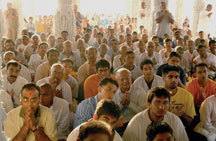
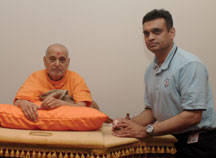
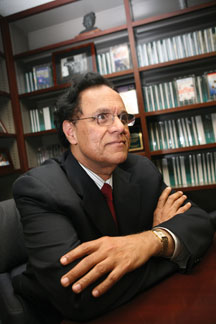
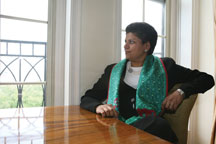
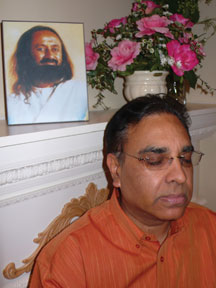
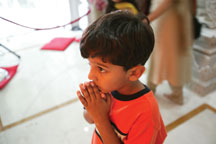
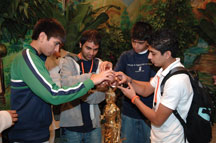
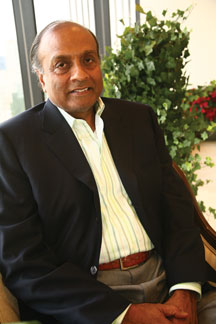
You must be logged in to post a comment Login